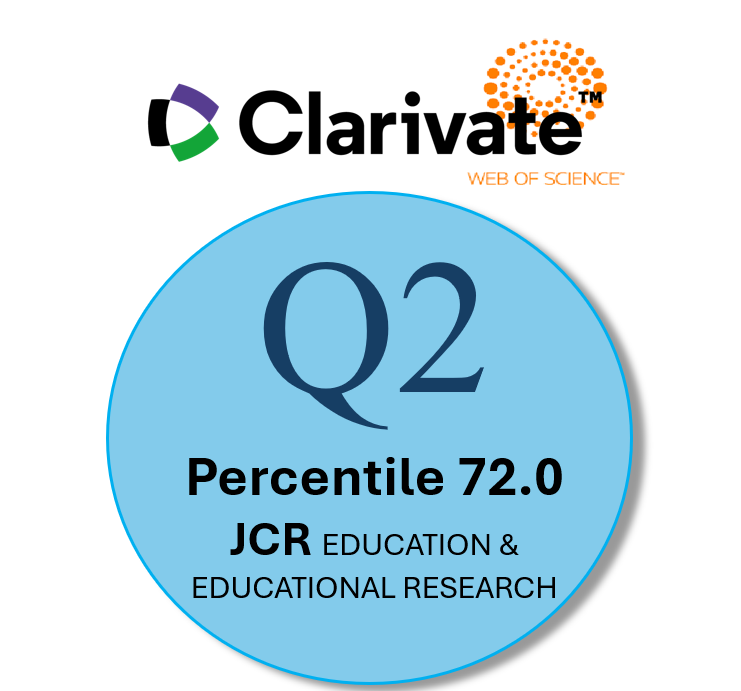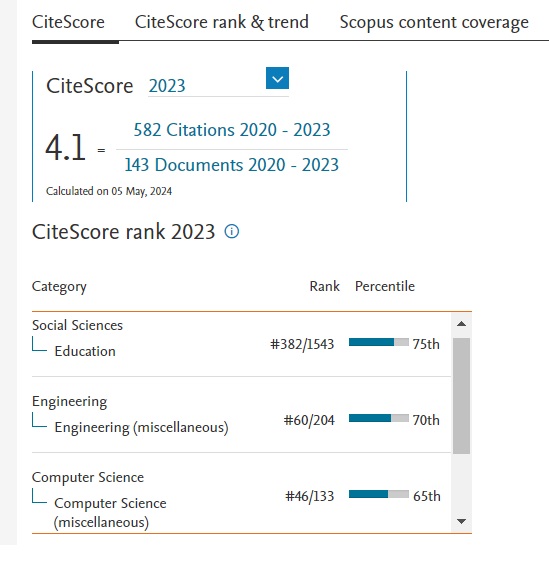Validación del modelo secuencial de la herramienta Schoolweavers para transformar ecosistemas educativos
Agencias de apoyo
- Ministerio de Ciencia y Educación, con número de referencia PID2020-118208RB-I00
Resumen
La colaboración dentro de las redes educativas promueve un uso eficiente de los recursos humanos y físicos, actuando como catalizador para la innovación, el cambio y la generación de capital profesional y social. Este artículo presenta la validación del modelo secuencial de la herramienta Schoolweavers desarrollada por el equipo de NetEduProject, con el objetivo de crear un recurso en línea dirigido a los equipos directivos que promueven estrategias para mejorar el capital social de sus escuelas y, en consecuencia, transformar el ecosistema de aprendizaje a través de la colaboración en red. Este instrumento contiene un cuestionario base que contempla 6 adaptaciones en función de la población destinataria. Cada uno de estos cuestionarios está configurado por 3 constructos con un total de 7 dimensiones. Los análisis factoriales exploratorio y confirmatorio mostraron evidencias de validez de convergencia, fiabilidad interna y de constructo, confirmando la utilidad del modelo secuencial como una herramienta diagnóstica y de transferencia de conocimiento impulsada desde la universidad para el apoyo de la comunidad escolar, ofreciendo a sus líderes una visión sistémica para detectar retos y oportunidades.
Descargas
-
Resumen629
-
PDF524
Citas
Alvarado, K. (2022). Explorando las relaciones entre clima escolar, satisfacción con la vida y empatía en adolescentes costarricenses. Revista Educación, 48, 1–16. https://doi.org/10.15517/revedu.v46i1.45127
Azorín, C. (2022). Collaborative Networking in Education: Learning Across International Contexts. REICE. Revista Iberoamericana Sobre Calidad, Eficacia y Cambio En Educación, 20(3). https://doi.org/10.15366/reice2022.20.3.004
Azorín, C., & Muijs, D. (2018). Collaboration networks in education: Evidences from schools in Southampton. Profesorado, 22(2), 7–27. https://doi.org/10.30827/PROFESORADO.V22I2.7845
Bakker, M., Leenders, R. T. A. J., Gabbay, S. M., Kratzer, J., & Van Engelen, J. M. L. (2006). Is trust really social capital? Knowledge sharing in product development projects. Learning Organization, 13(6), 594–605. https://doi.org/10.1108/09696470610705479
Bekkers, V., & Tummers, L. (2018). Innovation in the public sector: Towards an open and collaborative approach. International Review of Administrative Sciences, 84(2), 209–213. https://doi.org/10.1177/0020852318761797
Boseman, G. (2008). Effective leadership in a changing world. Journal of Financial Service Professionals, 62 (36–38)
Brunner, J. J. (2021). Higher education 2050: Disruptive innovations and incremental adaptations. IESALC - UNESCO, Futures of Higher Education.
Campo, L. (2014). Aprendizaje servicio y educación superior. Una rúbrica para evaluar la calidad de proyectos. TDX (Tesis Doctorals En Xarxa), 300.
Civís, M., Longás, E., Longás, J., & Riera, J. (2007). Educación, territorio y desarrollo comunitario. Prácticas emergentes. Educación Social. http://www.raco.cat/index.php/EducacionSocial/article/viewArticle/179310/0
Cole, M., & Engeström, Y. (2001). “Enfoque histórico-cultural de la cognición distribuida”. En G. Salomon (comp.) Cogniciones distribuidas. Consideraciones Psicológicas y Educativas. Buenos Aires.
Coll, C. (2016). La personalización del aprendizaje escolar El qué, el por qué y el cómo de un reto insoslayable César. ResearchGate, 2015, 1–36. http://nextgenlearning.org/%0Afile:///C:/Users/usuario/Downloads/Coll2016Lapersonalizaciondelaprendizajeescolar_revMS (1).pdf
Collier, J. (2020). Applied Structural Equation Modeling Using AMOS: Basic to Advanced Techniques. https://doi.org/10.4324/9781003018414
Corell, A., & García-Peñalvo, F. J. (2021). COVID-19: La encerrona que transformó las universidades en virtuales. Gaceta Cultural, 91, 23–26.
Daly, A. J. (2020). Networked Systems: Learning, Leading, and Leveraging Social Networks for Educational Change Under Contract with Harvard Education Press. Harvard Education Press, 1–23.
Daly, A. J., Liou, Y.-H., & Der-Martirosian, C. (2020). A capital idea: exploring the relationship between human and social capital and student achievement in schools. Journal of Professional Capital and Community.
Díaz-Gibson, J., Civís, M., Mayayo, J. L., & Romaní, J. R. i. (2017). Projectes d’innovació educativa comunitària : ingredients d’èxit i reptes.
Díaz-Gibson, J., & Daly, A. (2020). What if we understand Schools as Learning Ecosystems in times of COVID-19 pandemic. Teachers College Record.
Díaz-Gibson, J., Daly, A., Miller-Balslev, G., & Zaragoza, M. C. (2020). The SchoolWeavers tool: supporting school leaders to weave learning ecosystems. School Leadership and Management, October. https://doi.org/10.1080/13632434.2020.1770210
Díaz-Gibson, J., Zaragoza, M. C., & Solé, S. L. (2018). Social capital and social networks of teachers: Systematic review. Revista de Educacion, 2018(381). https://doi.org/10.4438/1988-592X-RE-2017-381-387
Esteban-Guitart, M., DiGiacomo, D. K., Penuel, W. R., & Ito, M. (2020a). Principios, aplicaciones y retos del aprendizaje conectado. Contextos Educativos. Revista de Educación, 33, 120–129.
Esteban-Guitart, M., DiGiacomo, D., Penuel, W., & Ito, M. (2020b). Principios, aplicaciones y retos del aprendizaje conectado. Contextos Educativos. Revista de Educación, 26(26), 157–176. https://doi.org/10.18172/con.3966
Fullan, M. (2019). Matiz, Por qué algunos líderes triunfan y otros fracasan (Vol. 148).
Goleman, D. (2002). Importancia de la Inteligencia Emocional. Test emocional. Educaciòn XX1, 5, 77–96.
Hair, J. F., Sarstedt, M., Hopkins, L., & Kuppelwieser, V. G. (2014). Partial least squares structural equation modeling (PLS-SEM): An emerging tool in business research. European Business Review, 26(2), 106–121. https://doi.org/10.1108/EBR-10-2013-0128
Hoffman, A., & Holzhuter, J. (2012). The evolution of higher education: innovation as natural selection. Innovation in Higher Education: Igniting the Spark for Success, American Council on Education, Rowman & Litttlefield Publishers Inc., 3–15.
Hoffman, D. M. (2009). Reflecting on Social Emotional Learning: A Critical Perspective on Trends in the United States. Review of Educational Research, 79(2), 533–556.
Iglesias Vidal, E., López Crespo, S., Muñoz Moreno, J. L., & Tarrés Vallespí, A. (2019). Alianzas entre centros escolares y organizaciones de apoyo socioeducativo en torno al soporte escolar. Pedagogía Social. Revista Universitaria., 34, 163–177.
Katz, S., & Earl, L. (2010). Learning about networked learning communities. School Effectiveness and School Improvement, 21(1), 27–51.
Kline, R. B. (2012). Principles and Practice of Structural Equation Modeling. In Canadian Graduate Journal of Sociology and Criminology (Vol. 1, Issue 1). https://doi.org/10.15353/cgjsc.v1i1.3787
Koufteros, X. (2009). Testing a Model of Pull Production: A Paradigm for Manufacturing Research Using Structural Equation Modeling. Journal of Operations Management, 17(467–488).
Kutsyuruba, B., & Walker, K. (2015). The lifecycle of trust in educational leadership: An ecological perspective. International Journal of Leadership in Education, 18(1), 106–121. https://doi.org/10.1080/13603124.2014.915061
Lamas Aicón, M. (2013). Innovación Escolar: Un Análisis Histórico-Cultural Y Sistémico De Cambio. 288. https://www.tesisenred.net/bitstream/handle/10803/129908/mla1de1.pdf?sequence=1&isAllowed=y
Lämsä, A.-M., & Pučėtaitė, R. (2006). Development of organizational trust among employees from a contextual perspective. Business Ethics: A European Review, 12(2), 130–141.
Levine, T., & Marcus, A. (2010). How the structure and focus of teachers’ collaborative activities facilitate and constrain teacher learning. Teaching and Teacher Education, 26(3), 389.
Lloret-Segura, S., Ferreres-Traver, A., Hernández-Baeza, A., & Tomás-Marco, I. (2014). El análisis factorial exploratorio de los ítems: Una guía práctica, revisada y actualizada. Anales de Psicologia, 30(3), 1151–1169. https://doi.org/10.6018/analesps.30.3.199361
Longworth, N. (2003). El aprendizaje a lo largo de la vida. Paidós.
Luksha, P., Cubista, J., Laszlo, A., Popovich, M., & Ninenko, I. (2018). Global Education Futures Report: Educational ecosystems for societal transformation. 117. https://www.edu2035.org/files/GEF Vision Educational Ecosystems for Societal Transformation.pdf
Macaulay, S., & Cook, S. (2001). Rewarding service success. Measuring Business Excellence, 5.
Mahsud, R., Yukl, G., & Greg Prussia. (2020). Leader empathy, ethical leadership, and relations-oriented behaviors as antecedents of leader-member exchange quality. Journal of Managerial Psychology, 25.
Martín Gutiérrez, Á., Antonio, J., & Lozano, M. (2013). Colaboración educativa en la sociedad del conocimiento. 5, 74–87. https://www.redalyc.org/articulo.oa?id=68830443007
Martínez-Celorrio, X. (2016). Innovación y reestructuración educativa en España: las escuelas del nuevo siglo. In Informe España 2016 (Issue December 2016). http://www.academia.edu/30974870/Innovación_y_reestructuración_educativa_en_España_las_escuelas_del_nuevo_siglo
Murillo, F. J. (2017). Avances en liderazgo y mejora de la educación. Actas Del I Congreso Internacional de Liderazgo y Mejora de La Educación., 496–498.
Naciones Unidas. (2020). Informe de políticas: La educación durante la COVID-19 y después de ella. Informe de Políticas:La Educación Durante La COVID - 19 y Después de Ella, 1(1), 29. https://www.un.org/sites/un2.un.org/files/policy_brief_-_education_during_covid-19_and_beyond_spanish.pdf
Pane, J. F., Steiner, E. D., Baird, M., & Hamilton, L. S. (2017). Informing Progress: Insights on Personalized Learning Implementation and Effects. RAND Corporation.
Podsakoff, P. M., MacKenzie, S. B., Lee, J. Y., & Podsakoff, N. P. (2003). Common Method Biases in Behavioral Research: A Critical Review of the Literature and Recommended Remedies. Journal of Applied Psychology, 88(5), 879–903. https://doi.org/10.1037/0021-9010.88.5.879
Podsakoff, P. M., MacKenzie, S. B., & Podsakoff, N. P. (2012). Sources of method bias in social science research and recommendations on how to control it. Annual Review of Psychology, 63, 539–569. https://doi.org/10.1146/annurev-psych-120710-100452
Rincón-Gallardo, S., & Fullan, M. (2016). Essential features of effective networks in education. Journal of Professional Capital and Community, 1(1), 5–22. https://doi.org/10.1108/JPCC-09-2015-0007
Sancho-Gil, J. M., Hernández Hernández, F., González Ramírez, T., Gewerc Barujel, A., & Hernández Rivero, V. M. (2022). University research networks as spaces for collaboration and social capital: The case of REUNI+D. Education Policy Analysis Archives, 30(August). https://doi.org/10.14507/epaa.29.7084
Serdyukov, P. (2017). Innovation in education: What works, what doesn’t, and what to do about it. Journal of Research in Innovative Teaching & Learning, 10(1), 4–33.
Sliwka, A. (2003). Resumen La escuela del mañana de gestión de las escuelas y los sistemas Overview Schooling for Tomorrow Networks of Innovation : Towards New Models. OCDE.
Sørensen, E., & Torfing, J. (2017). Metagoverning Collaborative Innovation in Governance Networks. American Review of Public Administration, 47(7), 826–839. https://doi.org/10.1177/0275074016643181
Spector, P. E., Rosen, C. C., Richardson, H. A., & Williams, L. J. (2017). A New Perspective on Method Variance: A Measure-Centric Approach. Journal of Management, 45(3).
Stromquist, N. P. (2005). Comparative and International Education: A Journey toward Equality and Equity. Harvard Educational Review, 75(1), 89–112.
Torralba, F. (2006). Bases per a una pedagogia de la coresponsabilitat. [En Línea].
UE. (2016). Schools policy - A whole school approach to tackling early school leaving. Ocde.
UNESCO. (2020). Respuesta educativa COVID-19, preparando la reapertura de las escuelas. UNESCO.
Wenger, E. (2001). Comunidades de práctica. Aprendizaje, significado e identidad. Paidós.
Derechos de autor 2023 Revista de Educación a Distancia (RED)

Esta obra está bajo una licencia internacional Creative Commons Atribución-NoComercial 4.0.
Las obras que se publican en esta revista están sujetas a los siguientes términos:
1. El Servicio de Publicaciones de la Universidad de Murcia (la editorial) conserva los derechos patrimoniales (copyright) de las obras publicadas, y favorece y permite la reutilización de las mismas bajo la licencia de uso indicada en el punto 2.
2. Las obras se publican en la edición electrónica de la revista bajo una licencia Creative Commons Reconocimiento-NoComercial-SinObraDerivada 3.0 España (texto legal). Se pueden copiar, usar, difundir, transmitir y exponer públicamente, siempre que: i) se cite la autoría y la fuente original de su publicación (revista, editorial y URL de la obra); ii) no se usen para fines comerciales; iii) se mencione la existencia y especificaciones de esta licencia de uso.
3. Condiciones de auto-archivo. Se permite y se anima a los autores a difundir electrónicamente las versiones pre-print (versión antes de ser evaluada) y/o post-print (versión evaluada y aceptada para su publicación) de sus obras antes de su publicación, ya que favorece su circulación y difusión más temprana y con ello un posible aumento en su citación y alcance entre la comunidad académica. Color RoMEO: verde.














